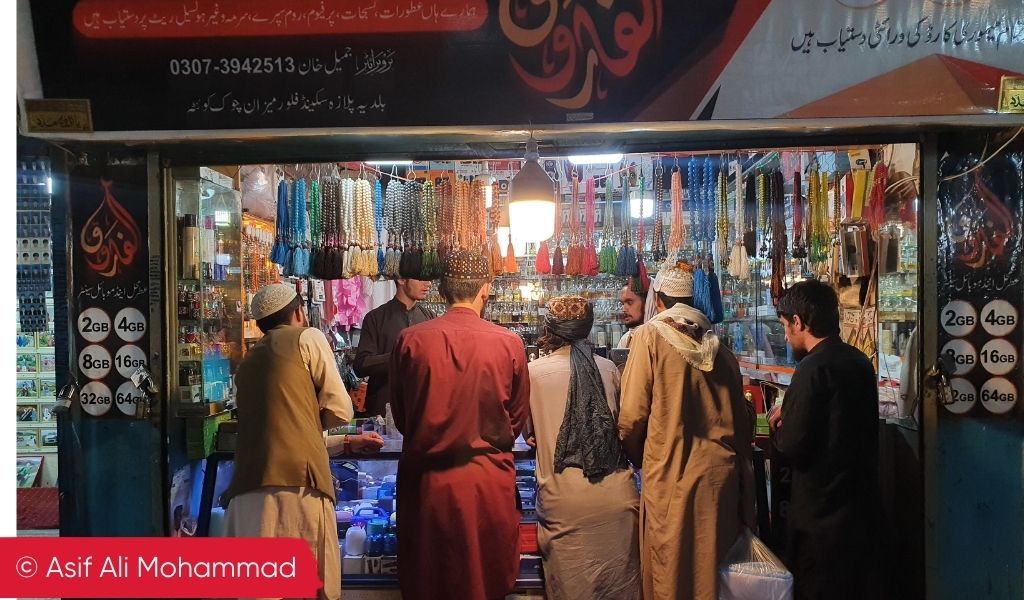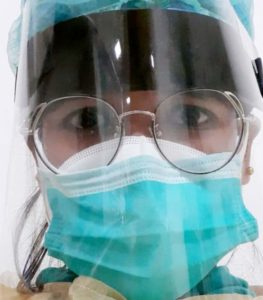In the first of our three part series on the impact of Covid-19 on attitudes towards Hazara Shia in Quetta, Pakistan, Sajjad Hussain and Raheela Habib describe how a survey of non-Shia population in Quetta, Pakistan, reveals that, in the wake of the Covid-19 crisis, distrust in local government perhaps more of a concern than negative attitudes towards the Hazara Shia minority, despite widespread social media hype (around a ‘Shia virus’) and discriminatory measures towards that community.

Meezan Chok, central Quetta, Pakistan. Credit: Asif Ali Mohammad
With the arrival of the coronavirus pandemic, ethnic and religious minorities were targeted worldwide. With China and Iran among the few countries most affected by the virus in earliest phases of this pandemic, Asian-American communities and Shia Muslims in Pakistan, perceived to have close cultural and religious ties with China and Iran respectively, were among those accused of ‘importing the virus’. Many religious minority communities, such as Muslims in India, were accused of local transmission in the months that followed.
Many religious communities were slow in adapting to the Standard Operating Procedures (SOPs) issued by the World Health Organisation (WHO) and their respective governments. To that extent, all sorts of gatherings, including religious ones, might have played a role in ‘spreading the virus’. However, the instinct to ‘blame’ or scapegoat’ minorities is deplorable.
To investigate attitudes to the virus and to try to measure trust in government, a group of students conducted a brief research exercise in Quetta, Pakistan.
Quetta is the capital of the south-western province of Balochistan, which borders Iran. Quetta was the site of confusion and contention in late February last year as the administration and local communities feared that the return of thousands of Pakistani Shia pilgrims from Iran would jeopardise the state of public health and safety.
Survey Methodology
Six students from a mix of Pakistani institutions of higher studies ran a short survey in July 2020 targeting Quetta’s non-Shia population. They collected 110 survey responses, with a 10% margin of error. To ensure a diversity of respondents, our team of enumerators visited popular public places, including shopping malls, busy local markets and the most-visited government offices, such as local courts. Respondents were randomly selected with a planned quota to ensure fair representation from major social groups such as Pashtoon, Baloch and Punjabi-Sindhi communities living in Quetta.
Here are the three key findings:
Finding 1: Many who were surveyed bought into coronavirus conspiracy theories
The survey indicates that a majority were sceptical of the origins and existence of the coronavirus. Asked if they believed the virus was a scientific reality, 49 per cent of the male respondents said ‘yes’. The figures were much better for female respondents at 68 per cent.
The acknowledgement of this pandemic ‘as a scientific fact’ was lowest among Quetta’s small business owners, only 27 per cent of whom said they believed the virus is a biological occurrence; the numbers were relatively better for professionals: 65 per cent of government, 62 per cent of non-government, employees agreed.
This appeared to highlight the need for an effective mass education campaign so that communities became aware of what is at stake and how to secure the lives of their loved ones.
Finding 2: Majority ‘not satisfied’ with government’s response to coronavirus
Only 18 per cent of all respondents said they were satisfied with the measures and management by the government to counter Covid-19; 74 per cent said they were not, with 8 per cent saying they felt ‘neutral’. Women expressed more trust in the government: 47 per cent said they would be comfortable if it established a quarantine centre in their neighbourhood compared to 33 per cent of men.
In some cases, newly established quarantine centres were burnt down in different areas of Balochistan, apparently showing the distrust between the government and communities.
There is a historical context to this prevalent public distrust in poorly-governed Balochistan; any solid response to a pandemic would require much-improved trust levels.
Finding 3: More a society is confused, more it could ‘scapegoat’ its minorities
Our survey hypothesis posited that lack of access to accurate scientific information and distrust between the citizenry and government institutions could result in scapegoating of vulnerable social groups such as ethnic and religious minorities.
39 per cent of all respondents, asked if the spread of the virus in the province was due to Shia Hazara pilgrims coming from Iran, said ‘Yes’ but 36 per cent said they were not. (Broken down by gender, it was 44 per cent of women, 37 per cent of men – which surprised the researchers, who thought women might show more sympathy or understanding for the Hazara Shia pilgrims).
Perhaps the persistent history of anti-government sentiments in the region could explain why 53 per cent of all respondents said Hazaras’ protests against the government (about the lack of facilities in quarantine camps) were valid and necessary. This compared to 26 per cent who disagreed.
Questioned about the decision to send exclusively Hazara employees on forced leave due to suspicion that they might spread coronavirus, 57 per cent of all male and 47 per cent of all female respondents said it was an ‘incorrect’ one.
Conclusion
The survey indicates that the government has a lot to do to build trust in the general public in Balochistan. Some in government singled out Shia Hazaras to cover up for their own inefficiency which made Shia Hazaras, already treated in a discriminatory way, feel more isolated and vulnerable. Asked if they had seen a change in attitude towards Hazaras (after they had been blamed for spreading Covid-19), overall 61% respondents agreed that they had, while 39% denied this.
With a probable third wave of the coronavirus on the rise across Pakistan, it is time the government stepped up with more effective public information campaigns.
Raheela Habib is the co-founder of Women Initiators (WI), a community organization for women’s empowerment in Hazara Town. She is a researcher at the National Center for Bioinformatics, Quaid-i-Azam University, Islamabad. She tweets @RahilaHabib
Sajjad Hussain Changezi is a Rotary Peace Fellow and a graduate of Global Studies from the University of North Carolina at Chapel Hill. His research and activism revolve around human rights in the Pakistan-Afghanistan region. He tweets @Changovski



